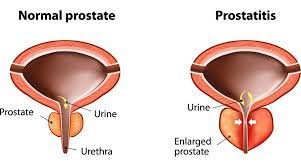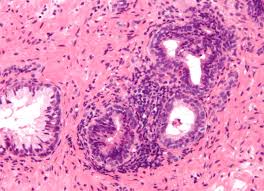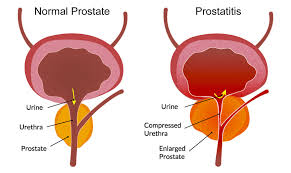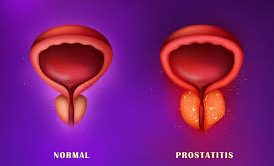Do You Need Prostatitis Treatment? Inflammation and swelling of the prostate gland is prostatitis. The prostate gland produces fluid (semen) that transports sperm cells and nourishes it.
Prostatitis often causes difficult or painful urination. Other symptoms include pain in the pelvic area or genitals and groin, accompanied by flu.
Men of all ages are not invincible when it to the effects of prostatitis, but this condition seems quite common in men 50 or older. There are several causes of this condition; sometimes, you may not be able to identify the cause. Usually, prostatitis is triggered by a bacterial infection, but you can treat it with antibiotics.
Prostatitis patients may recover quickly on their own, or there is a possibility that you might need treatment. Some types of prostatitis keeps recurring or (chronic prostatitis) may last for months.
Causes of Prostatitis
The cause of acute bacterial prostatitis often is ordinary strains of bacteria. When acute bacteria in your urine leaks and enters your prostate, that’s when the infection starts. You can use antibiotics to treat this infection. If antibiotics fail to remove the bacteria, prostatitis might return. If this happens, it will be difficult to treat (chronic bacterial prostatitis).
Surgery or trauma in the lower area of the urinary tract can cause nerve damage. This might contribute to prostatitis, and it doesn’t occur due to bacterial infection. Mostly, you may not be able to identify the actual cause of prostatitis.
Types of Prostatitis
· Acute Bacterial Prostatitis
The cause of acute bacterial prostatitis is a particular strain of bacteria. Generally, this type of prostatitis starts unexpectedly and cause symptoms like flu, fever, nausea, chills, and vomiting.
· Chronic bacterial Prostatitis
When antibiotics don’t get rid of the bacteria, you possibly will find it difficult-to-treat or increase recurring infections. You may witness only minor symptoms or no symptoms at all for short periods during chronic bacterial prostatitis.
· Chronic prostatitis/chronic pelvic pain syndrome
Chronic pelvic pain syndrome is the most common type of prostatitis, which is not caused by bacteria. Mostly, you cannot identify the exact cause of bacteria. Some symptoms stay the same for a long time; they don’t either increase or decrease with time. Therefore, other symptoms continue to follow the cycle of being less and more severe.
· Asymptomatic Inflammatory Prostatitis
Asymptomatic inflammatory prostatitis is one of the types of prostatitis. Usually, it is found by chance, especially when you undergo tests because it doesn’t display symptoms. Also, asymptomatic inflammatory prostatitis doesn’t need any treatment.
Symptoms
Following are the signs and symptoms of prostatitis:
- You will feel burning or sensation of pain while urinating (dysuria)
- Complexity urinating, such as hesitant or dribbling urination
- Urinating frequently, especially at night (nocturia)
- Urgent need to urinate
- Cloudy urine
- Blood in the urine
- There will be a pain in your groin, abdomen, or lower back
- Pain in part between the rectum and scrotum (perineum)
- Discomfort or pain in the testicles or penis
- Ejaculation will be painful
- Flu
Prostatitis Treatment
Acute prostatitis can cause an infection of the prostate. Thus, doctors prescribe antibiotics for the treatment of prostatitis. The selection of antibiotics depends on the organism present and the severity of the issue. Usually, doctors advise taking antibiotics orally and continuing it for around two to four weeks to eradicate the bacteria entirely. Doctors might prescribe IV antibiotics for severe or nonresponsive cases.
Bacteria can also cause chronic bacterial prostatitis, but their treatment is relatively more complicated. Doctors may recommend you a longer course of antibiotics that you must follow for almost four to eight weeks. However, the choice of antibiotic for chronic bacterial prostatitis also depends on the bacteria present and its severity. You can choose between oral and intravenous antibiotics.
Most of the asymptomatic prostatitis doesn’t need treatment. Moreover, while managing the treatment, it consists of anti-inflammatories and antibiotics.
As for chronic pelvic pain syndrome, it is pretty challenging to treat because all patients do not respond to their current treatments. Hence, there are numerous medications in existence to treat chronic pelvic pain syndrome. But you can utilize anti-inflammatory medications, alpha-blockers, antibiotics, and estrogen reabsorption inhibitor for treatment.
We advise you to consult with your doctor or visit our website if you experience pelvic pain, painful or difficult in urination, or problem ejaculating. If not properly treated in a timely fashion, there is a chance that prostatitis can cause severe health issues or worsen the infection.
For prostatitis treatment, call us today to schedule an appointment:
 Dr. Larish is a urologist and surgeon treating women and men with a variety of urological conditions. His expertise is in treating complex kidney stones, enlarged prostates (BPH), incontinence, erectile dysfunction, infertility, and urological oncology (prostate, bladder, kidney, and adrenal cancers). He is an expert in general urology and is often consulted for second opinions.
Dr. Larish is a urologist and surgeon treating women and men with a variety of urological conditions. His expertise is in treating complex kidney stones, enlarged prostates (BPH), incontinence, erectile dysfunction, infertility, and urological oncology (prostate, bladder, kidney, and adrenal cancers). He is an expert in general urology and is often consulted for second opinions.






 Bacteria reach the prostate through the urine and can lead to a
Bacteria reach the prostate through the urine and can lead to a  Prostatitis is an infection that exclusively affects males. A male is diagnosed with acute prostatitis when his prostate gland becomes infected, leading to the organ’s inflammation. The prostate is a small gland that surrounds a man’s urethra, the tube that takes urine and semen out of the body. The prostate supplies nutrients to semen, performing an important role in reproduction. Description of causes, symptoms, and treatment of prostatitis are enumerated in the following paragraphs.
Prostatitis is an infection that exclusively affects males. A male is diagnosed with acute prostatitis when his prostate gland becomes infected, leading to the organ’s inflammation. The prostate is a small gland that surrounds a man’s urethra, the tube that takes urine and semen out of the body. The prostate supplies nutrients to semen, performing an important role in reproduction. Description of causes, symptoms, and treatment of prostatitis are enumerated in the following paragraphs. We at Fifth Avenue Urology normally treat prostatitis with antibiotics. We recommend our patients to continue taking the prescribed antibiotics for at least 4-6 weeks. The class of antibiotics that we stipulate to a specific patient depends on the type of bacterium responsible for the infection.
We at Fifth Avenue Urology normally treat prostatitis with antibiotics. We recommend our patients to continue taking the prescribed antibiotics for at least 4-6 weeks. The class of antibiotics that we stipulate to a specific patient depends on the type of bacterium responsible for the infection.